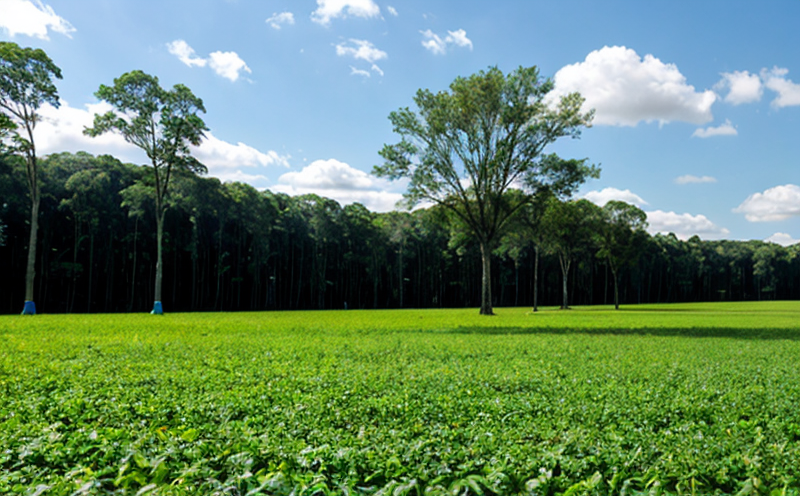Soil Biodegradability Testing of Packaging Materials
The environmental impact of packaging materials is a critical concern in today’s sustainability-driven world. As consumer demand for eco-friendly products grows, so does the need to ensure that packaging materials are biodegradable and do not contribute to long-term pollution. Soil biodegradability testing evaluates how quickly and effectively packaging materials decompose in soil conditions, providing essential data for environmental compliance and product development.
This test is particularly important because it helps companies understand whether their products will break down harmlessly over time or if they may leave persistent residues that could contaminate the environment. It allows businesses to make informed decisions about material selection, ensuring that any packaging used aligns with both regulatory requirements and corporate sustainability goals.
The process typically involves exposing samples of packaging materials to controlled soil environments under laboratory conditions where temperature, humidity, and microbial activity are carefully monitored. Over time, the rate at which these materials degrade is assessed based on weight loss, structure change, or other relevant indicators. This information is crucial for manufacturers who aim not only to meet regulatory standards but also to enhance their brand reputation by offering more sustainable offerings.
Accurate soil biodegradability testing ensures that companies can comply with regulations such as those set forth in ISO 17289 and ASTM D5864, which specify methods for determining the compostable properties of plastics. These standards provide structured protocols to conduct reliable tests across various conditions, ensuring consistency within industries.
By understanding how packaging materials behave under realistic soil environments, businesses can optimize their formulations to achieve faster breakdown rates while maintaining structural integrity during use. Such insights enable innovation in product design without compromising safety or functionality. Moreover, successful completion of this test can serve as proof that a company is committed to reducing its ecological footprint and promoting circular economy principles.
Furthermore, soil biodegradability testing plays an integral role in enhancing supply chain transparency by giving suppliers confidence about their materials' environmental performance early on in the development process. This approach fosters collaboration between different stakeholders involved at every stage of production—from raw material sourcing to end-of-life disposal solutions.
In summary, soil biodegradability testing is essential for developing sustainable packaging that meets both regulatory expectations and consumer demands for environmentally responsible products. Through rigorous scientific evaluation conducted according to established international guidelines, this service helps companies contribute positively towards achieving global environmental objectives while maintaining high-quality standards in their operations.
Applied Standards
| Standard Code | Description |
|---|---|
| ISO 17289:2016 | Biodegradable plastics – Determination of biodegradation in soil by measuring mass loss and CO₂ evolution. |
| ASTM D5864-16a | Standard test method for determination of compostable plastic materials using aerobic digestion with black soldier fly larvae (Hermetia illucens). |
Benefits
Conducting soil biodegradability testing offers numerous advantages for businesses operating within the consumer products and product safety sectors. Compliance with regulatory requirements is one key benefit, ensuring that companies remain up-to-date on current environmental policies and avoid potential penalties associated with non-compliance.
In addition to meeting legal obligations, this service helps organizations enhance their reputation by demonstrating commitment to sustainability efforts. Consumers increasingly prioritize eco-friendly products when making purchasing decisions; thus, showcasing leadership in responsible resource management can significantly boost brand image and customer loyalty.
The insights gained from such testing enable companies to refine product designs and improve material selection processes continuously. By identifying optimal biodegradable options early on in the development cycle, businesses can reduce unnecessary waste throughout their supply chains while promoting circular economy practices.
Moreover, successful completion of soil biodegradability tests serves as valuable documentation supporting claims made regarding a product's environmental friendliness. This certification provides reassurance to stakeholders that products meet rigorous standards set by recognized bodies like ISO and ASTM.
Industry Applications
The application of soil biodegradability testing extends beyond mere compliance; it plays a vital role in advancing the development and implementation of sustainable packaging solutions across multiple industries. For instance, food manufacturers may use this service to assess whether their current or proposed packaging materials will decompose safely and effectively within natural environments after disposal.
Similarly, pharmaceutical companies could benefit from understanding how drug delivery systems interact with soil microorganisms during degradation. This knowledge ensures that no harmful byproducts are released into the environment while still allowing for efficient therapeutic outcomes.
Additionally, manufacturers of personal care products might employ this service to evaluate whether their containers or applicators pose risks if ingested unintentionally by wildlife after being discarded improperly. Such findings help ensure product safety and minimize potential harm caused by improper disposal practices.
Furthermore, the construction industry can leverage soil biodegradability testing to explore innovative ways of incorporating sustainable materials into building projects without sacrificing structural integrity or aesthetic appeal. By integrating eco-friendly elements that naturally decompose over time, builders contribute positively towards reducing landfill burdens and fostering green infrastructure.





